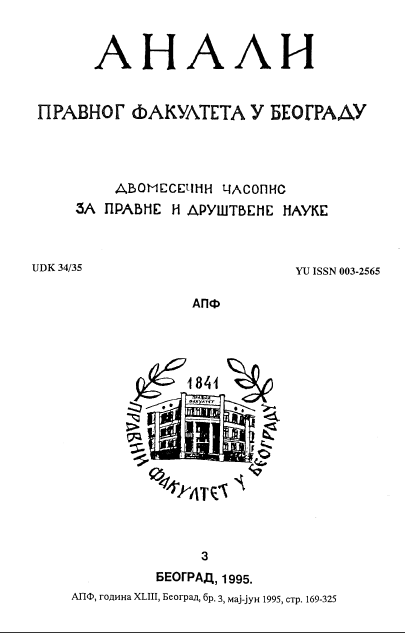ПЕРИКЛОВСКА ДЕМОКРАТИЈА И КУЛТУРНЕ ВРЕДНОСТИ
PERICLES’ DEMOCRACY AND CULTURAL VALUES
Author(s): Predrag VukasovićSubject(s): History of Law
Published by: Правни факултет Универзитета у Београду
Keywords: Democracy; Alliens; Pericles
Summary/Abstract: The period of classical Athens is not only a culmination of Athenian culture; it marks at the same time a period in which the Athenian political, military, and cultural powers have made possible for that polis to raise - at least at the ideological and theoretical levels - the question of political unification of the Hellenic world on the foundations of its cultural unity, permeated predominantly with cultural achievements of the Athenian polis. Athenian imperalism strived, and partially succeeded, to use the supremacy of that city in the most important aspects of spiritual and artistic creativity, for its expansionist aims. With the exception of Sparta, where there existed an active hostility to Hellenic culture, in oligarchic poleis - rivals of Athens, one did not notice any considerable resistance to Athenian cultural influences. This did not necessarily mean that cultural propaganda of the Athenian democracy has been particularly efficient. New cultural values, as developed in the second part of the fifth century', have considerably been instrumental in the process of dividing into layers of the Athenian society, while forming, to quite a degree, political attitudes of various social layers. Spiritual revolution effected by sophistis, particularly in the sphere of morals, has been objectively aimed against the ruling political order and its ideology, although some of the sophists, such as Protagoras, have expounded new arguments in favour of democracy. During the War of Pelopponesus, together with the increase of external pressure and internal tension, hindering more and more normal functionning of institutions of Pericles’ democracy, have brought about final rift between the members of Athenian cultural elite and the great majority of the demos. This process has found its expression in early Aristophanes’ comedies and Plato’s dialogues. The death of Socrates marks the culmination of the cultural struggle being waged in Athens for almost a century, i.e. since the disintegration of the aristocratically oriented culture of the Archaean era.
Journal: Анали Правног факултета у Београду
- Issue Year: 43/1995
- Issue No: 3
- Page Range: 225-250
- Page Count: 26
- Language: Serbian

